Nato muscle-flexing sends Putin firm message
- Published
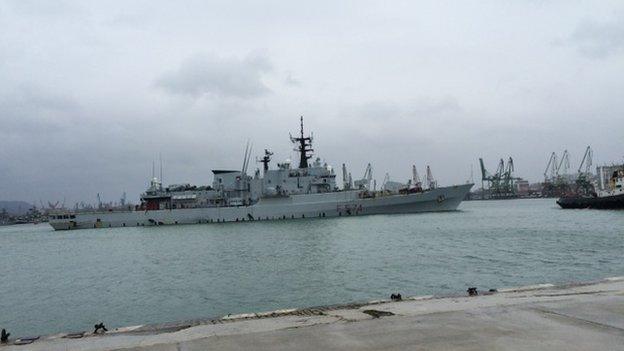
An Italian frigate was among the Nato forces in the Black Sea
There is the sound of a gun firing in the Bulgarian port of Varna as Nato's Maritime Group Two, external comes into harbour.
Don't worry, it's not war: they are firing a line ashore so they can tie up.
But there is tension and purpose in the air.
This is the Black Sea, international waters with a new Russian military presence, external on the Crimean Peninsula.
"Sunseeker" proclaims the clubhouse at the port, but you will seek in vain today - Varna is lashed by rain and high seas.
First into harbour is the sleek, low grey shape of the Italian frigate, external, followed by a bulkier German refuelling tanker., external Lastly a Turkish frigate, external pulls alongside them both.
The Italian commodore, Mario Giancarlo Lauria, takes me on a tour of the ship - from the flight deck to ops room.
I observe with delight that alongside the hi-tech electronic maps, supplemented by radar, is a rather marvellous old-fashioned chart, complete with ornate versions of the flags of the countries bordering the Black Sea - Turkey, Romania, Bulgaria, Ukraine - and now, in Crimean - Russia.
The group has already been followed by Russian planes and ships - the commodore tells me: "We have some contact. We know Russian ships and aircraft are here."
He says Nato has not been aggressive: "Obviously we want to provide assurance to our allied countries what we can do here in the Black Sea."
About 300 miles north-east of here, straight across the turbulent grey-green waters, is Crimea, annexed by Russia from Ukraine last year.
Since then President Putin has moved advanced missile systems, external into the peninsula - Nato says they can now hit just about any country in the area.
Some US politicians even claim the Russians are planning to move nuclear weapons, external to Crimea as well.
The Russians have warned, external Nato's exercise is a militarisation of the Black Sea.
Denial of provocation
The angry waves are keeping the flagship, the USS Vicksburg, out at sea and so I speak to the man in charge, Rear Adm Brad Williams, by telephone.
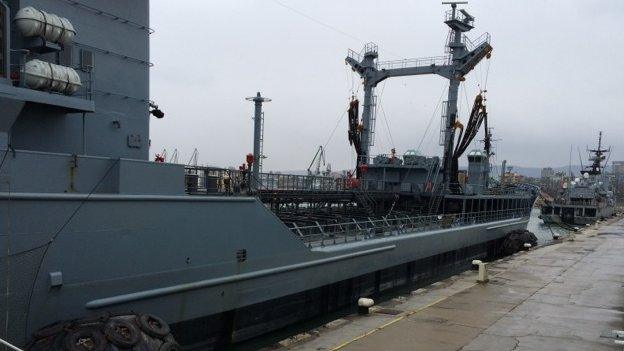
A German refuelling tanker joined the exercise
"We're not here to provoke anyone in any way," he tells me.
"We are here to train with our allies. This was scheduled back in 2014, and if we didn't come that would send a negative message to our allies, that the training with them wasn't important - it is vitally important.
"It does provide a reassurance to them that they are part of an alliance we care about, and that Nato's resolve is solid and firm."
Few things are simple in this part of the world and the tensions underlying the Ukraine crisis are present here too.
Similar cultures
Bulgaria is culturally close to Russia - they share a similar Orthodox faith, external.
They also share the Cyrillic alphabet, and Varna has a good claim to be one of the places where that script was designed.
Bulgaria was perhaps the Soviet Union's closest ally.
Russia is certainly still celebrated as the country that liberated it from the Ottoman yoke, not least in the siege of Varna, external.
But it is not just history.
It is hard to believe it on this grey day but Varna is Bulgaria's playground for summer fun - Russian tourists and Russian money are hugely important.
Last year local club owners organised an anti-Nato march.
One local we spoke to said Russians were their friends. The crisis in Crimea didn't worry him in terms of security, only because it had put off tourists coming to this resort.
A Bulgarian naval officer taking part in the Nato exercises was circumspect: "I don't think this is a Nato exercise. It is just an opportunity for my ship to train with the Nato group, and I am very happy with this."
He said he had not seen more Russian activity in the Black Sea.
When I asked him whether the exercise was designed to reassure Nato members like Bulgaria of their safety, he refused to answer.
Mixed messages
There is a curious dichotomy: what you hear, here on the ground, or rather on the swell of the sea, is very different to the noises coming from Nato's high command in Brussels.
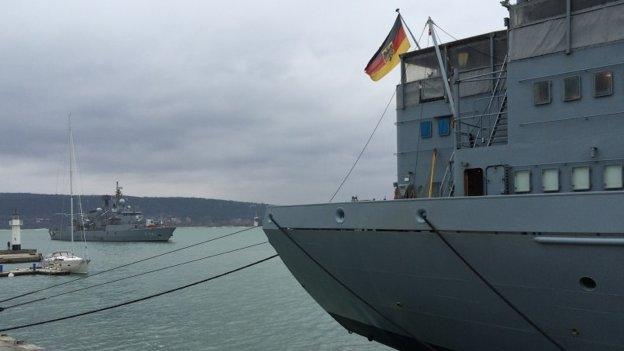
German, Turkish and Italian vessels took part
Here, it is all business as usual, reassurance that this is a routine exercise, nothing out of the normal.
The top brass, however, are making it clear this is one part of a spring and summer of exercises and deployments specifically designed to warn President Putin off even thinking about attacking Nato countries.
These include the land exercise Summer Shield in Latvia, external, Dynamic Mongoose, a submarine exercise, external off the coast of Norway, and Deployex, the test for a new 5,000-strong rapid reaction force, called Spearhead, external.
Along with that six new command-and-control units will be set up - one here in Bulgaria, the others in Estonia, Latvia, Lithuania, Poland and Romania.

Nato members:
1949: Belgium, Canada, Denmark, France, Iceland, Italy, Luxembourg, Netherlands, Norway, Portugal, UK, US
1952: Greece, Turkey
1955: Germany
1982: Spain
1999: Czech Republic, Hungary, Poland
2004: Bulgaria, Estonia, Latvia, Lithuania, Romania, Slovakia, Slovenia
2009: Albania, Croatia

Nato sources say that is a direct reaction to Russia's occupation of Crimea - which they describe as quick and slick, catching the Western alliance off guard.
So Nato appears to have changed its posture fairly dramatically, external - a change widely reported in dribs and drabs, but hardly debated or discussed as a whole.
The short-term purpose is very clear - to discourage Russian adventures into Nato territory.
The long-term strategy towards Russia is less obvious, external.
Unsophisticated approach
Retired head of British Special Forces Lt Gen Graeme Lamb worries that the West may be taking an unsophisticated approach.
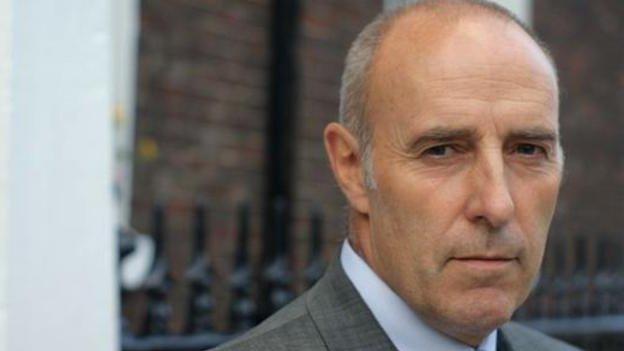
Lt Gen Lamb is concerned about the West's approach to Russia
He says Putin doesn't have the money to support the sort of military he wants.
"The old world order is unravelling. We've lost the art of where we think we should have points of dialogue with President Putin.
"It's important we don't just have a binary view that if he is financially crushed, that Russia is crushed again as in 1989, that will be a good thing for world balance - if anything things would become more unbalanced.
"This is not 'the great game' as we used refer to it - Russia referred to that same period as the 'tournament of shadows', which is a far more sophisticated view."
But Nato is only an instrument, if a curiously semi-autonomous one. In the end it is the tool of its member states.
The European Union's approach to its eastern borders is a patchy work in progress, stitched together slowly even as the facts change on the ground.
President Obama has adopted a position of Zen-like calm and a reliance on sanctions that does little to reassure twitchy allies.
I asked the veteran diplomat of the Cold War, Henry Kissinger, whether he thought such assertive military exercises made sense.
He said: "Nato needs to develop a strategy for the future and it needs to hold exercises that are relevant to that strategy.
"They have found it difficult to accept the proposition that Cold War conditions may be returning, and because the vast majority of Nato governments have subordinated defence expenditure to domestic programmes they haven't had the capacity to develop meaningful strategy to deal with a major attack."
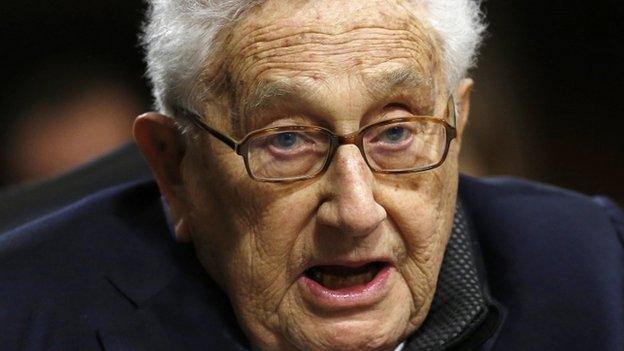
Henry Kissinger warned defence spending was vital
He is the latest to join the chorus on defence spending.
"I read the other day an account of the diamond jubilee of Queen Victoria, and the naval march parade that passed in front of her, and it makes me melancholy to think today Britain has only one aircraft carrier, which it shares with France.
"Big countries of Europe, if they want to play a global strategic role, have to develop forces adequate for this. Not because America says so, but they have to balance their intentions with their capacities."
But Dr Kissinger returns to the point about diplomacy, saying more flexible diplomacy could have avoided the Ukraine crisis.
"It is essential that both Russia and Nato take a serious look at their diplomatic options because if they fail, then I think a return to Cold War conditions is very likely."
Ambivalence
As the European Union, economically weakened, politically challenged from within, hesitates and debates about the nature of its purpose and the limits to its ambition and its borders, Russia shows no such introspection.
Bulgaria is not the only country with some ambivalence.
Putin has strong political sympathisers in countries as varied as Hungary and France.
There are Russian minorities in Estonia and Latvia, as much as Ukraine.
Above all there is Russian money, in Serbia, Cyprus, Montenegro, and, come to that, London.
A more resolute Nato may be part of the solution, or it may be part of the problem.
But there is a lack of serious debate about how it fits into wider Western strategy towards Russia.